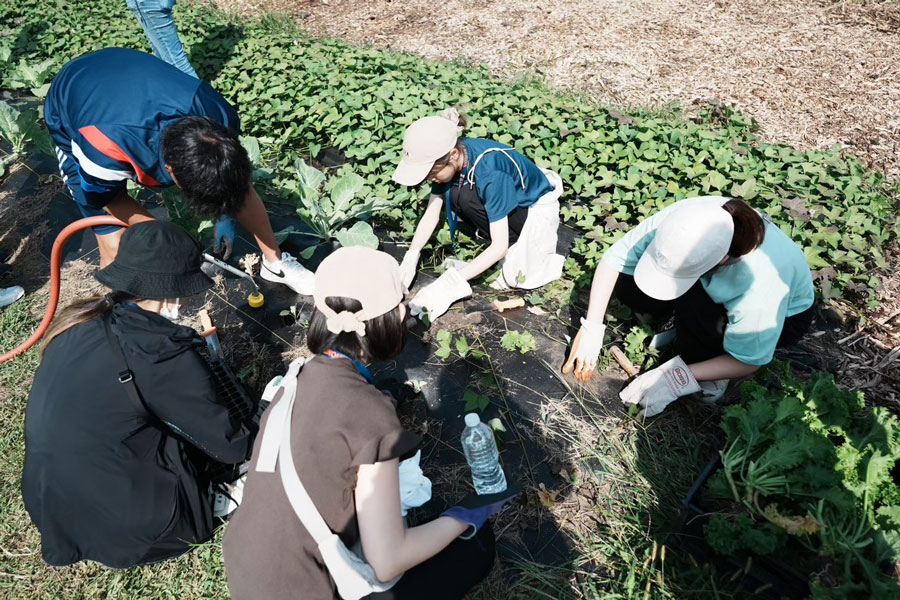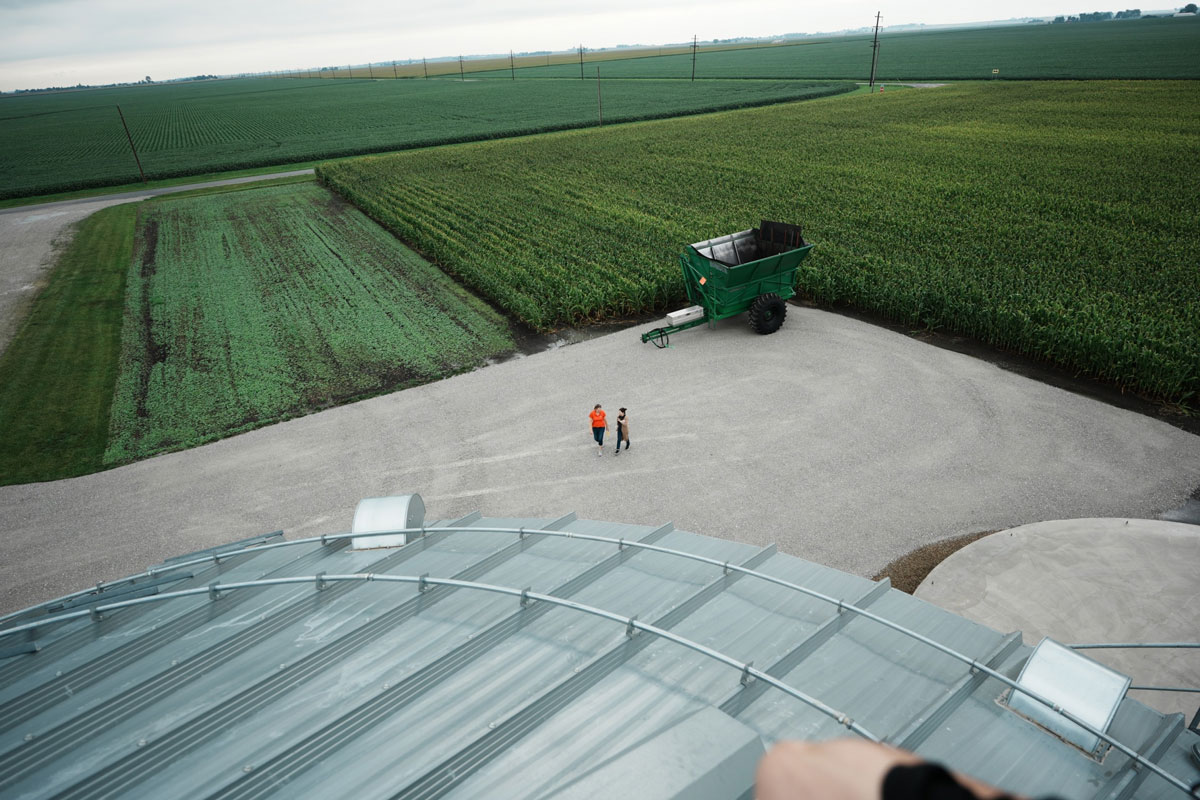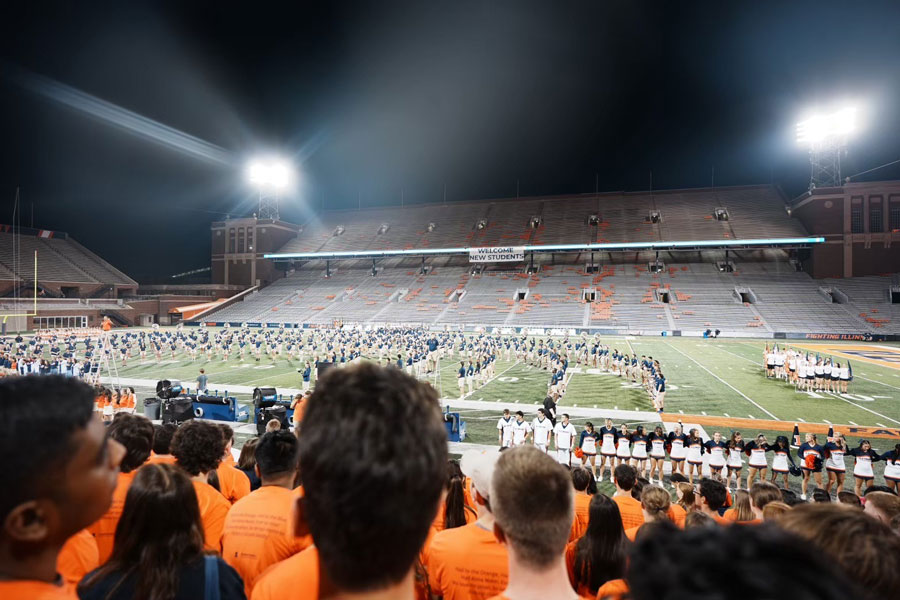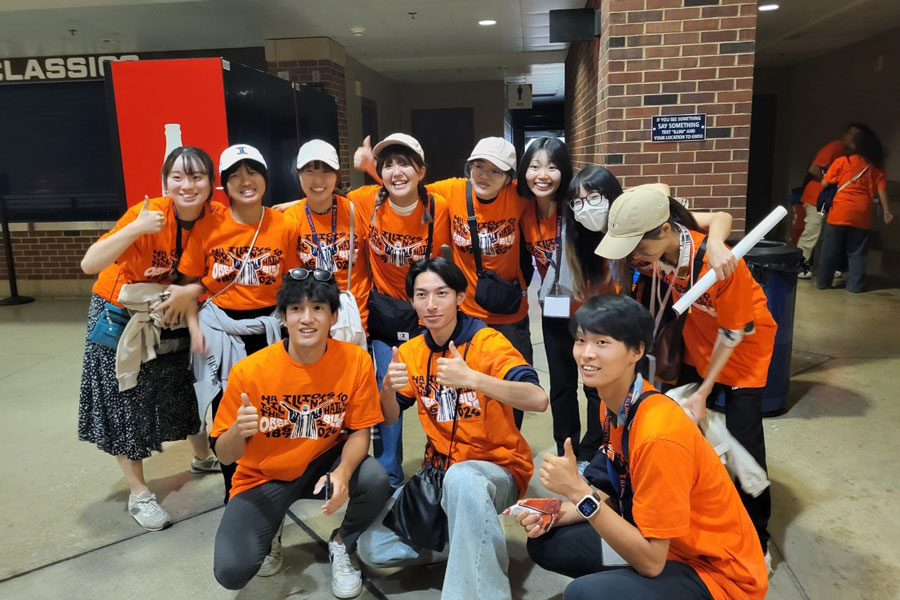
Kyushu University and University of Illinois Urbana-Champaign strengthen partnership with two-week summer program for students
From August 13 to 26, 11 Kyushu University students—six from the School of Agriculture, one from the Graduate School of Bioresource and Bioenvironmental Sciences, and four from the School of Interdisciplinary Science and Innovation (ISI)—participated in a study program at the University of Illinois Urbana-Champaign focusing on the agriculture, environment, and the people of Illinois.
Program and Partnership
The program was organized by Kyushu University’s Faculty of Agriculture and the University of Illinois College of Agricultural, Consumer and Environmental Sciences (ACES), Office of International Programs. Its aims were to foster future leaders in the fields of environment and food by enhancing students' problem-solving skills and broadening their international perspectives. It provided a comprehensive understanding of the culture, agricultural value chain, and environmental systems of central Illinois, with a particular focus on the interactions between the environment, agriculture, and people. In addition, it supports Kyushu University's VISION 2030 by promoting international research and education related to "Environment and Food."
This program is part of the extended strategic partnership between U Illinois and Kyushu U, which began in 2010 with the establishment of the International Institute for Carbon-Neutral Energy Research (I2CNER) at Kyushu U. In 2019, the two universities renewed their partnership agreement and expanded it to include other university faculties and initiatives.
“In July of 2023, Dr. Matt Rosenstein, the director of Global Education and Training at U Illinois came to Fukuoka for a lecture series hosted by Kyushu U. That is when we found out that the Chancellor of U Illinois, Dr. Robert J. Jones, was an authority on plant physiology,” explains Professor Mako Nakamura from the Faculty of Agriculture, an organizer of the program. “This encounter sparked the idea of creating a student program between U Illinois, and Kyushu U’s Faculty of Agriculture.”
In September 2023, the Chancellor himself came to Kyushu U with his delegation. During that visit, Nakamura introduced the Chancellor to the Faculty of Agriculture and advanced their discussions for an education and research exchange program. The following year, in March of 2024, a Kyushu U delegation which included Nakamura and Professor Yasuaki Hiromasa from Kyushu U’s International Education Navigation Center (who was an Associate Professor at the Faculty of Agriculture at the time), went to U Illinois where discussions continued on putting the program together, with ACES in mind.
“We wanted to the program to emphasize both research and education. But we realized that focusing on both would be too difficult, especially for a two-week period. ACES suggested that we focus on education instead,” added Hiromasa.
Research and Community
Each day was filled with activities and lectures highlighting the various avenues of science, food, and agricultural research at U Illinois. Students toured facilities such as the Food Science Lab, the Integrated Bioprocessing Research Laboratory, and the Meat Science Laboratory, and heard from the researchers who run these labs. The faculty highlighted both the cutting-edge research being conducted at the university and how their work contributes to the local community.
The students also learned about the lives and experiences of the local community. By volunteering at the Eastern Illinois Foodbank, students learned about food insecurity and the support infrastructure needed to help those in need. Tours of the Prairie Fruits Farm and Creamery and Sola Gratia Farm gave them new insight into the motivations and operations of local agricultural businesses.



One of the more impactful parts of their experience was the students’ visit with local corn and soybean farmers. Flying into Urbana-Champaign, the students were stunned by the vast Midwestern fields of corn and soybeans as far as the eye could see. Talking with the farmers not only increased their understanding of the economic and technological operations that run these large farms, but also the science and environmental impact of the work; especially when it came to the use of genetically modified organisms (GMOs).

“During my studies, I learned a lot about Japan’s strict regulations on GMOs. I had always wondered why there was such a difference in attitude between Japan and other countries, and how it came about,” said Hinata Kawamura, a second-year student from the School of Agriculture. “I took the opportunity of this short-term program to ask about it. I got the impression that at an American agricultural scale, agriculture would not be viable without the use of GMOs.”

Unlike Japan, large-scale farming in the U.S. involves the application of significant amounts of pesticides and fertilizers on farmland. This has resulted in substantial environmental pollution not only to the farmland itself but also to the water systems and downstream environments. By visiting a local large-scale farm, the students learned about local efforts to reduce the use of chemical pesticides through the use of GMOs, and the removal of nitrogen from excess fertilizers using bioreactors.
“The farmers explained to us that GMO seeds reduce the number of times pesticides need to be sprayed, thereby reducing pesticide exposure for workers and the surrounding environment. They explained that it is environmentally friendly because it does not kill agriculturally beneficial insects.” states Nami Nakamura, a first-year master’s student from the Graduate School of Bioresource and Bioenvironmental Sciences. “In my life in Japan I don’t think I’ve ever met a person who said GMOs are environmentally friendly.”
But it wasn’t just lectures and research that the students enjoyed. The end of August was also new student orientation week at U Illinois, and students were able to experience the high energy of American university culture. From outdoor movie showings and sport club activities, students were able to experience all sorts of events across campus. This culminated in ‘Illinois Sights & Sounds’ a massive event held at Memorial Stadium home to the university’s world-class American Football team, the Fighting Illini. There, incoming freshmen experienced the university’s athletic traditions to instill and build school pride.


“One of the events that made me understand the hospitality of the city was Friday Night Live. Every Friday, bands set up and play music all over the city. I saw many people surrounding the bands and listening to their music. People of all ages came together and started dancing. In Japan, almost no one would do that in a public place,” says Mana Kotani a second-year undergraduate student from the School of Agriculture.
Growth and the Future
The students certainly made an impression on members of the U Illinois community.
Lauren Karplus, Assistant Director of the ACES Office of International Programs who worked tirelessly to make the students feel at home said, “I am very impressed with each and every one of these students. They are kind and really thoughtful, willing to try anything, and very appreciative of every experience. They even taught me some exciting things about Japan. I hope that this program will lead to students from U Illinois going to Kyushu U, and more exchanges of researchers on an individual basis.”
“Lauren was phenomenal throughout our time here. She put a tremendous amount of effort into designing the program and provided invaluable support to all of us,” adds Associate Professor Hiroko Kita of the Faculty of Agriculture, one of the other organizers of the program and who joined the students at U Illinois. “This time has been amazing for the students. Before the two-week program, almost none of them knew each other. By the end, they were closer than ever. I am very happy for the students to have this kind of program.”

“This program was a major success. Everyone has grown as a team and as individuals. Experiencing new things outside of Japan, and the scale of a US university has certainly given the students new perspectives,” concludes a joyous Hiromasa. “Reflecting on this partnership between us and U Illinois, I am excited on what our two institutions can accomplish in both research and education. While this is the first time we organized a program focused on education, there is already ongoing research collaboration. In the Faculty of Agriculture Professor Hideki Hirakawa from Kyushu U and Assistant Professor Amit Rai from U Illinois ACES have been working together in the field of crop genomics. I expect our institutions will build more research collaborations in the future.”
The two universities are already in discussions on a program for U Illinois students to come to Kyushu U in 2026.

About the partnership
University of Illinois Urbana-Champaign































